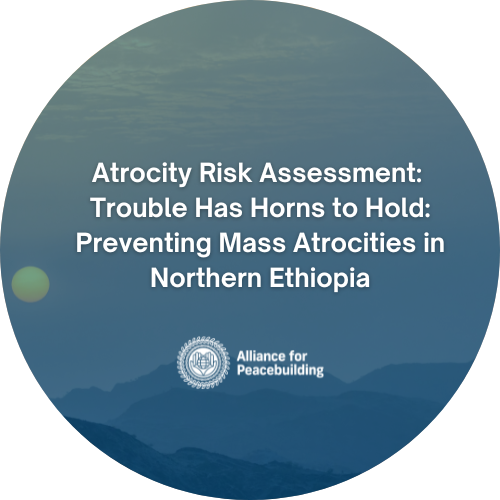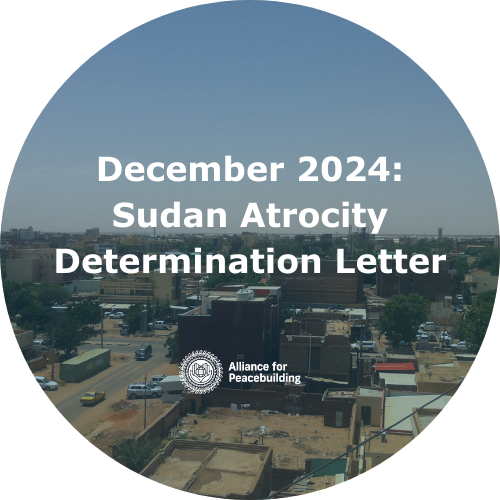This atrocity risk assessment, authored by Ethiopian and American atrocity prevention experts, analyzes worst-case but high probability scenarios in northern Ethiopia, including Tigray and its borderlands with Eritrea, Afar, and Amhara. If these scenarios occur, they will likely precipitate mass violence against civilians while also causing a widespread regional crisis. It also identifies central risk factors, key actors, triggers, and resiliencies that could affect the course of conflict.
Read MoreThis assessment explores risks of mass atrocities in South Sudan due to increasing violence, the detention of senior officials, lagging progress in the implementation of the Revitalized Agreement on the Resolution of the Conflict in South Sudan (R-ARCSS) of 2018, and regional spillover from the violent conflict in Sudan. Compounding these drastically deteriorating conditions, South Sudan’s first elections since independence, originally scheduled for December 2024, have been postponed until December 2026. This assessment identifies plausible atrocity scenarios, key indicators to monitor, and recommended prevention and response options for the United States Government and the international community.
Read MoreThe Alliance for Peacebuilding (AfP), a network of 235+ organizations working to prevent violent conflict and build sustainable peace in 181 countries, recognizes that these are extraordinary times with significant cuts to U.S. foreign aid. AfP has long been a proponent of reforming diplomacy and foreign assistance, and championed major innovations through laws such as the Global Fragility Act (GFA). In rebuilding the U.S. foreign policy and assistance aperture, Congress must advance reform-focused laws that prioritize and integrate conflict prevention and peacebuilding, like the GFA, become centered to ensure the U.S. is safer, stronger, and more prosperous. We urge the 119th Congress to robustly fund, champion, and provide oversight of key peacebuilding and prevention laws and accounts and ensure conflict prevention expertise is retained at the Department of State.
Read MoreOn May 15th, PPWG AfP sent a letter from the Prevention and Protection Working Group (PPWG) to Secretary of State Marco Rubio urging him to prioritize atrocity prevention during the reorganization of the Department. At a time of record-breaking levels of violent conflict and rising mass atrocities, the proposed reorganization of the Department concerningly eliminates or downsizes several key offices and bureaus that are central to the successful implementation of the Elie Wiesel Genocide and Atrocities Prevention Act (EWGAPA), which Secretary Rubio co-sponsored and President Trump signed into law. Dismantling or deprioritizing the atrocities prevention and accountability offices and bureaus and terminating their experts will dramatically undermine the ability of the U.S. Government to implement EWGAPA and effectively respond to destabilizing mass atrocities and grave human rights abuses globally.
Read MoreOn April 30th, in light of the proposed reorganization of the State Department by the Trump Administration, AfP sent a letter signed by 24 other organizations to Secretary of State Marco Rubio urging him to retain conflict experts, ensure a clear and dedicated entity charged with implementing key prevention laws, and robustly integrate conflict prevention and peacebuilding throughout all assistance and diplomacy in conflict-affected and fragile states.
Read MoreCentering peacebuilding and conflict prevention in U.S. foreign policy and assistance is not just the right thing for the incoming Trump Administration to do—it is the smart, strategically sound, and cost-effective thing to do. Every dollar invested in conflict prevention saves $16 that would otherwise be spent on expensive humanitarian or security responses. Peacebuilding’s inherent multisectoral, coordinated, and crosscutting approach results in more informed, evidence-based, and fit-for-purpose interventions that address the underlying drivers of violent conflict, violence, and insecurity. The previous Trump Administration made important strides by signing into law the Global Fragility Act (GFA) in 2019, along with other key laws that elevate conflict prevention and peacebuilding in U.S. foreign policy and assistance. By picking back up this mantle, the incoming Trump Administration has an opportunity to reduce and prevent violent conflict, violence, and fragility, stabilize rampant insecurity, and build sustainable peace at a time of record-breaking global conflict. However, to do so, the Trump Administration must ensure robust implementation of their laws and strategies, which requires changing the way the U.S. does business and prioritizing conflict prevention and peacebuilding. Such an approach can help the U.S. outmaneuver its geopolitical competitors, save American taxpayer money, and build a cadre of long-term allies and partners to advance U.S. interests and security globally.
Read MoreDear Secretary Blinken,
We, the undersigned organizations, write with deep concern about the ongoing and increasing atrocities in Sudan, including war crimes, crimes against humanity, and potentially genocide. In December 2023, we welcomed your determination that members of the Sudanese Armed Forces (SAF) and Rapid Support Forces (RSF) had committed war crimes, and that the RSF and allied militias committed crimes against humanity and ethnic cleansing since the conflict broke out in April 2023. Now, in light of the alarming developments over the last year, we urge you to issue an updated atrocity determination for Sudan and take concrete actions to protect civilians and prevent further atrocities in line with the Elie Wiesel Genocide and Atrocities Prevention Act, the U.S. Strategy to Anticipate, Prevent, and Respond to Atrocities, the Women, Peace, and Security Act, the U.S. Strategy and Action Plan on Women, Peace, and Security, and other U.S. prevention-oriented laws and policies. An updated atrocity determination should include war crimes and crimes against humanity perpetrated by both the SAF and RSF, as well as assess whether any of the crimes committed to-date constitute genocide.
Read MoreThe Prevention and Protection Working Group (PPWG) at the Alliance for Peacebuilding convened extensive consultations to compose the following assessment of and recommendations for the report to Congress of the U.S. Government’s (USG) atrocity anticipation, prevention, and response activities in 2023-2024, as required by Section 5 of the Elie Wiesel Genocide and Atrocities Prevention Act (EWGAPA). This assessment also addresses the implementation of the 2022 United States Strategy to Anticipate, Prevent, and Respond to Atrocities (SAPRA) and the use of the 2021 Atrocity Risk Assessment Framework (ARAF). The purpose of this assessment is to assist the USG in strengthening its reporting and improving the efficacy of anticipating, preventing, and responding to atrocities by identifying and analyzing trends, gaps, and opportunities to enhance measurement and demonstrate impact.
Read More







